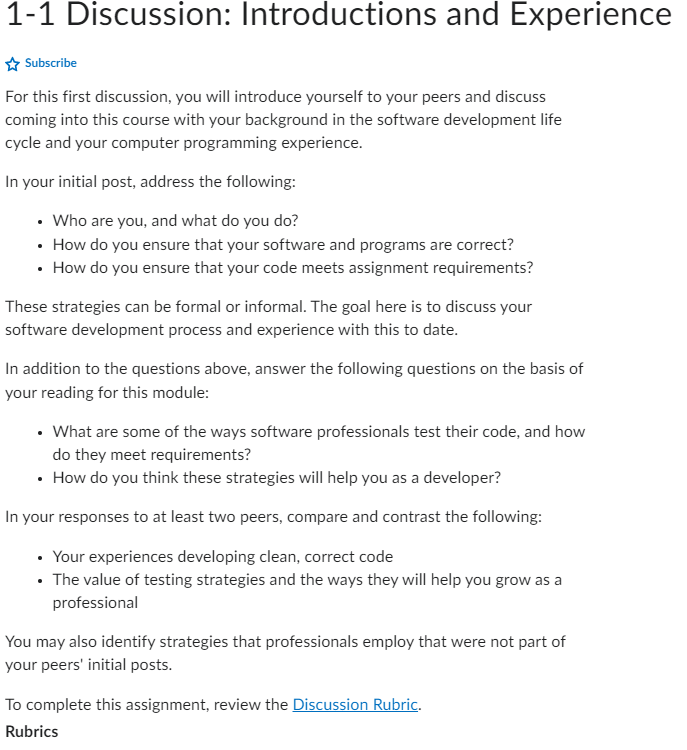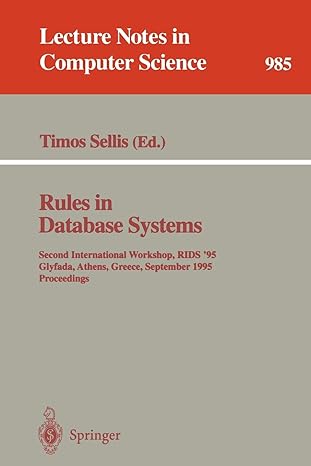Question
No need to respond to this My post : hello everyone! I hope everyone is having a great week and I wish everyone the best
No need to respond to this
My post :
hello everyone!
I hope everyone is having a great week and I wish everyone the best this term.
Who are you, and what do you do?
My name is Maytham, and I'm pursuing a computer science bachelor's degree. I was born and raised in the Middle East, I currently live in NH. Although I'm not in the tech industry yet, I hope to find out shortly. Hence, the majority of my SDLC expertise and any programming skills come from the courses and my own personal time working on side projects for my portfolio.
How do you ensure that your software and programs are correct?
The major way I make sure the software and programs I write are accurate is by running them and checking to see whether the results are accurate. It's a good sign if the program is functioning as intended. If I am unable to resolve the problem, I will attempt to debug the software to determine what is wrong by looking at error messages and conducting some research. Before using any other tools at my disposal, I always attempt to solve the issue on my own. But, the primary way I check that my software and programs are proper is by running and testing them and observing the correct output.
How do you ensure that your code meets assignment requirements?
I ensure that my code complies with the assignment's needs by maintaining strict code standards. I strive to create clean, maintainable code that is simple to read and comprehend. To make sure that my code is readable by whoever is viewing the code, I attempt to add as many comments as I can where I think they are required. I also use a ton of whitespace. I constantly double-check my work to make sure I'm also fulfilling all the demands placed on me.
What are some of the ways software professionals test their code, and how do they meet requirements?
Before revealing their work to anyone else, software engineers should go through the following important software testing stages.
1. Testing fundamental functionality
2. Code review
3. Analysis of static code
4. Unit testing
5. Performance tests with a single user
How do you think these strategies will help you as a developer?
These strategies would definitely benefit me as a developer because I will be able to make sure that my code meets the standards required of me. I do more than just write, run, and distribute code. My ability to test my code will allow me to write robust, maintainable code.

Only respond to this:
Hello Classmates,
My name is Frank, and I am a computer science major. I reside in New Jersey and have a wife and three children. I am a consultant for the legal profession and perform accident reconstruction in civil liability issues and insurance subrogation.
I feel I am still very new at coding and programming. Throughout my previous courses, where I was either required to write code or add to existing code, I first read carefully through the assignment requirements. Generally, the instructor laid out exactly what the system was expected to do. This is comparable to user stories where a project manager listens to expectation of the customer. I always wrote my code in an integrated development environment (IDE) and used the build and compiling tools to find errors and either used tool recommendations to repair the code or conducted additional research to change or fix the problem. However, before compiling the code, I generally did constant unit testing, when possible, to ensure at first that the function was working and then expanded the unit testing as I coded along.
The reading indicated that testing strategies might be affected by the type of development model one used. For example, using the V model would include test stages, component (unit) testing, integration testing, system testing and acceptance testing, although this pattern appears to be rather consistent, no matter which model you develop in. That is to say that the V model testing strategy makes common sense, test the small stuff, then see if it works together incrementally, then see if the whole programs works and finally see if the client and customer can use it. This appears to be a reoccurring theme no matter what model is used.
Some testing efforts I had personal experience with included basic Functionality testing, where you ensure that every available click works. I experienced this a bit when I coded a travel site that required a few user windows and commands. Although my code compiled and ran seemingly perfectly, during this effort I found a spelling error that would not be picked up by the IDE but was important anyway. Another important technique involves static code analysis which I do not believe I have done yet. This type of testing allows for the testing of the final code before it is run and can expose security issues. I checked to see if Eclipse and Visual Studios has this tool, and I am a bit uncertain. It does look like they have the capability, but it may require add on tools. In any case, I found static testing appear in chapter three of our text, so I do not want to jump ahead.
As a programmer, learning how to use the testing tools already provided will be essential to be productive. It will also help identify testing tool shortcomings.
Thanks,
1-1 Discussion: Introductions and Experience Subscribe For this first discussion, you will introduce yourself to your peers and discuss coming into this course with your background in the software development life cycle and your computer programming experience. In your initial post, address the following: - Who are you, and what do you do? - How do you ensure that your software and programs are correct? - How do you ensure that your code meets assignment requirements? These strategies can be formal or informal. The goal here is to discuss your software development process and experience with this to date. In addition to the questions above, answer the following questions on the basis of your reading for this module: - What are some of the ways software professionals test their code, and how do they meet requirements? - How do you think these strategies will help you as a developer? In your responses to at least two peers, compare and contrast the following: - Your experiences developing clean, correct code - The value of testing strategies and the ways they will help you grow as a professional You may also identify strategies that professionals employ that were not part of your peers' initial posts. To complete this assignment, review the Discussion Rubric. RubricsStep by Step Solution
There are 3 Steps involved in it
Step: 1

Get Instant Access to Expert-Tailored Solutions
See step-by-step solutions with expert insights and AI powered tools for academic success
Step: 2

Step: 3

Ace Your Homework with AI
Get the answers you need in no time with our AI-driven, step-by-step assistance
Get Started


